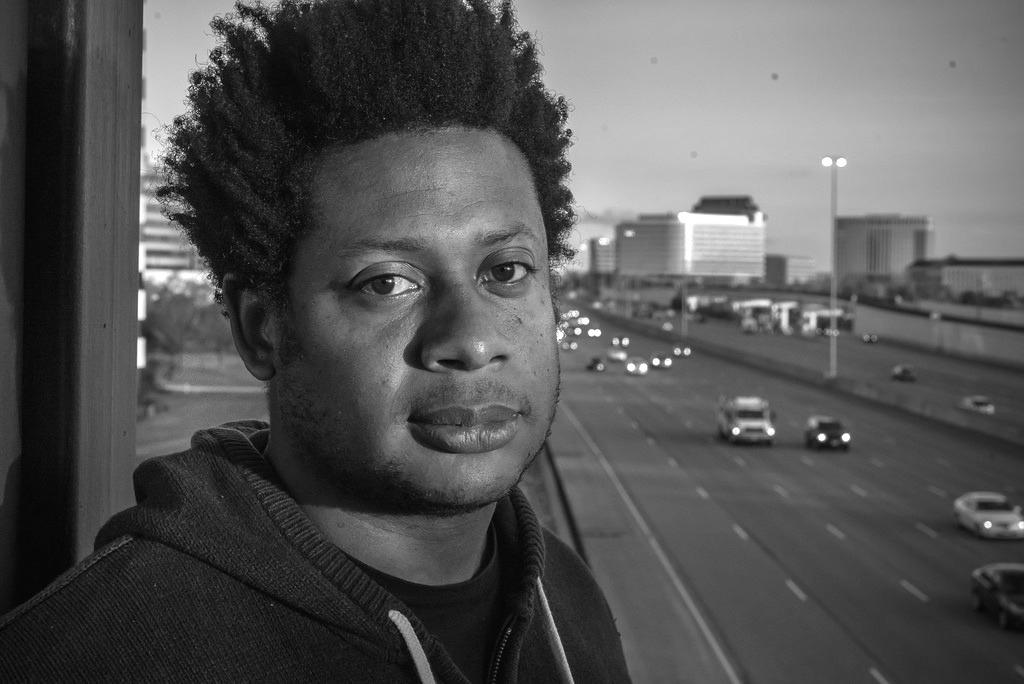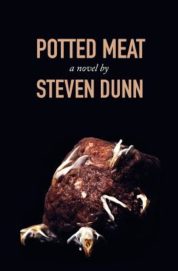
by Zack Kopp
 Steven Dunn’s first book, Potted Meat (Tarpaulin Sky, 2016), introduced readers to his spare, powerfully evocative voice. The novel, about growing up poor and Black in Kimball, West Virginia, proceeds in elliptical fragments as opposed to a continuous narrative, giving it a timeless quality. Yet despite the universality of his writing, Dunn is often pigeonholed because of his race. For example, he tells me that “a photographer for a magazine (I don't want to say who because the magazine handled the issue immediately after I told them about it) wanted me to put my hood on and ‘make a mean face like when I'm doing my jam poetry.’ I think he meant slam poetry. On top of that, I get emails every January from white organizers in Denver asking me to be a featured slam poet for the Black History Month event. I used to direct them to actual slam poets, but realized that was messed up of me to put that on real slam poets, sending these insincere organizers their way who probably just want to make themselves feel better for having ‘diversity.’ Man, and this type of shit got worse during the pandemic/recent police murders of Black people. Often, white organizers ask me to come on podcasts, magazines, etc., to talk about ways I've experienced racism, but they haven't read my work or know much about me as a writer.”
Steven Dunn’s first book, Potted Meat (Tarpaulin Sky, 2016), introduced readers to his spare, powerfully evocative voice. The novel, about growing up poor and Black in Kimball, West Virginia, proceeds in elliptical fragments as opposed to a continuous narrative, giving it a timeless quality. Yet despite the universality of his writing, Dunn is often pigeonholed because of his race. For example, he tells me that “a photographer for a magazine (I don't want to say who because the magazine handled the issue immediately after I told them about it) wanted me to put my hood on and ‘make a mean face like when I'm doing my jam poetry.’ I think he meant slam poetry. On top of that, I get emails every January from white organizers in Denver asking me to be a featured slam poet for the Black History Month event. I used to direct them to actual slam poets, but realized that was messed up of me to put that on real slam poets, sending these insincere organizers their way who probably just want to make themselves feel better for having ‘diversity.’ Man, and this type of shit got worse during the pandemic/recent police murders of Black people. Often, white organizers ask me to come on podcasts, magazines, etc., to talk about ways I've experienced racism, but they haven't read my work or know much about me as a writer.”
 Potted Meat was succeeded two years later by Water & Power (Tarpaulin Sky, 2018), Dunn’s fictionalized account of his service aboard a nuclear submarine, where he was relegated to rations stamped UNFIT FOR PRISON USE. Water & Power is delivered in a similarly spare, evocative style, and includes, unlike Potted Meat, a series of reproduced, official documents exemplifying bureaucracy and war profiteering at the expense of soldiers’ lives. “Water & Power's political statement is largely anti-war, and a statement against singular heroic military narratives that are often created and glorified by straight, white men. I feel somewhat responsible to my Blackness as a writer, because I'm the writer I am because of a community of Blackness, legacies of Blackness, inherited Black culture, and a wide spectrum of Black arts. I always think about what those things have given me: beauty, joy, lamentation/celebration, a sense of belonging, ugliness, a love for the discarded and decayed, Black imagination—and I try to also return those gifts the best way I know how. In a way, I'm always creating out of Blackness, and I hope the impact I have on Black writing is one of reciprocity.”
Potted Meat was succeeded two years later by Water & Power (Tarpaulin Sky, 2018), Dunn’s fictionalized account of his service aboard a nuclear submarine, where he was relegated to rations stamped UNFIT FOR PRISON USE. Water & Power is delivered in a similarly spare, evocative style, and includes, unlike Potted Meat, a series of reproduced, official documents exemplifying bureaucracy and war profiteering at the expense of soldiers’ lives. “Water & Power's political statement is largely anti-war, and a statement against singular heroic military narratives that are often created and glorified by straight, white men. I feel somewhat responsible to my Blackness as a writer, because I'm the writer I am because of a community of Blackness, legacies of Blackness, inherited Black culture, and a wide spectrum of Black arts. I always think about what those things have given me: beauty, joy, lamentation/celebration, a sense of belonging, ugliness, a love for the discarded and decayed, Black imagination—and I try to also return those gifts the best way I know how. In a way, I'm always creating out of Blackness, and I hope the impact I have on Black writing is one of reciprocity.”
Where white writers might spend years attempting a writing style comfortably accessible by people of all races, genders, and educations, this feeling of statelessness is born of advantage, from never having had to uphold their cultures. Dunn says, “I still don't strive for or know what's universal. I'm always torn on the idea of what's accessible writing because readers are so wide. Years ago, at a reading, Fred Moten was asked about accessibility, and he said, ‘It's not a good idea to assume someone else's ability to understand.’ That stuck with me and complicated everything I thought and continue to think about universality and comfortably accessing writing. I read a lot books by queer women, and it's not comfortable for me to access because that's not my lived experience, and I don't think it should be comfortable for me to access because I should be doing the work to listen and try to understand. I think this idea of ‘universal’ is a very white thing and a very male thing and a very upper-middle class thing and a somewhat U.S.A thing. I say that because as a student/reader in the world, it seems that most books that get talked about as being universal are written by who I described above. I've heard The Great Gatsby, and the like, praised for their universal qualities. Whiteness (and a lot of white people, for the most part in the U.S.) has had a long history of self-imposed importance and arrogance that leads to the ideas that their concerns are universal, that their voices are neutral, that their version of English is standard, and that their skin tone is what ‘flesh colored’ is for commercial products like band-aids and stockings and shit.”
As a reader, Dunn prefers writing that makes him feel like he is part of the story’s unfoldment, and that includes “a lot of children's books, especially Berenstain Bears Get in a Fight (because I had a younger sister), and Beverly Cleary books (because I grew up running around in the woods too). I also feel acknowledged by architectural books because I wanted to be an architect, and still do, so I read a lot about it. About my philosophy on good writing: I don't have one, but I love writing that makes me feel like I'm participating in the creation of it, and where I'm able to use my full spectrum of senses to feel my full spectrum of emotions. I don't like being led along mostly; I like to feel like I have the agency to explore. But that's not always true because I love Fast & Furious movies and that's totally being led along [laughs]. Oh, and another thing about good writing, I love writing that shakes the shit out of me, that breaks me open. I know that's pretty abstract and broad, and there's a lot of ways to go about shaking the shit outta somebody, but I like that broad and open idea because I get to keep cataloguing ways it's done. Examples where I feel like a co-creator: Selah Saterstrom's novels, The Pink Institution, The Meat & Spirit Plan, and SLAB; Nikki Wallschlaeger's Houses; Khadijah Queen's I'm So Fine; Gail Scott's The Obituary and My Paris.”
Dunn’s current writing project is a book on Nasir bin Olu Dara Jones (aka Nas), the hip hop artist from Queensbridge widely considered one of the greatest rappers in history. “I don't have a title yet, none of my rough titles even sound that good. Maybe I'll have a title by the time I finish the book. I haven't been putting together soundtracks for each chapter, because most of the chapters are based on one song, or a few of the songs that have common themes and narrative structures. The interplay of rap and writing for me is 1) Rap is literature so they're not that separate. 2) I just wanna write some shit that I been joyful about, had fun with, and studied my whole life. 3) Part of it is questioning this idea that in order to be a writer you have to have read or currently read a lot. I read one book from ages 12-21, and I turned out to be a writer. But I listened to a LOT of rap, and that's the first shit I went to ‘read’ when I started trying to be a writer. So what the fuck is reading? Is it listening, is it reciting rap lyrics for decades?”
“The one book I read from ages 12-21 was The Old Man and the Sea, which I really like. I haven't thought much about how that book affects my writing today, other than it being a short book, which I write short books, so maybe there's something there. I don't see any threads with that book and my book about rap, but I'll think about that more. That's a good-ass question! You know, because Hemingway is an old white dude that's in the canon, I've been resistant to even think about how that book affects my writing about rap, which is a traditionally marginalized form of literature made mostly by marginalized people. I didn't realize that until you asked the question. I'm not placing a value judgment on my resistance, but there's something there in terms of what is accepted literature and who is allowed to write it. So I don't know, I'll keep thinking: does Hemingway's book affect my writing about rap, should I allow it to if it doesn't? When writing about Nas, am I inspired to a higher degree of cultural identification as usual? I haven't thought about that. I don't think so, because I've had a lifetime of identifying with that, so that's taken care of, and I think I'm inspired to honor rap and the ways we often discuss it, listen to, and play with it in our communities. Shit, I guess that is culture identification. Okay, the answer is yes [laughs].”
My would-be universal perspective in writing, uncorrupted by cultural imperative, has always been tempered by the range of my experience. For all my years of self-immersion in Black arts, I remain fundamentally, separately white. When the cops show up, I worry maybe I’ll end up in jail, not be murdered. “I think it's a very white act to assert or imply the idea of transcending race, which is definitely writing out of whiteness,” says Dunn. “I'm not saying you, or people who think like that, are being malicious, but it's a result of whiteness/white culture. All of that ties into my response to your question about writers having a political responsibility. I think it's all political; our very existences, what jobs we have, who we live around, what types of characters populate our books and how they behave, is all political. It's a political act to assume a non-racialized set-up, or to feel politics don't belong in art, because it's already there. So I'm opposite in the belief that politics don't belong in art, and I do think writers could have more of a political responsibility. Like me (or anybody writing about Black people), I think we have a responsibility to show a full range of humanity within Blackness, because we aren't afforded that privilege in a lot of other areas outside of art, and that's a political act.”
“I love watching popular movies, the ones I love and even the ones I hate, like Star Wars, just to see what they're up to narratively and socially, and just for plain ol' fun sometimes. I actually learn a lot about storytelling from watching Keeping Up With The Kardashians and other reality shows. I think Moonlight is a political movie because it addresses systemic poverty and shows gay, Black men being joyful, experiencing pain, being tough, and being tender. I also think Star Wars was political, because there was only one Black dude, Finn, in a galaxy far, far away, with no Black family, but his job is to help a white lady hero. And I think stuff like that is a result of white writers unintentionally overlooking, or intentionally ignoring their political responsibility. In the Star Wars writer's imagination, there is one Black person in the future. To me, that's a real horror movie.”
Dunn maintains the responsibilities of a husband and father while holding down a day job in Denver and embodying a presence in the local spoken word scene. “My family is great—we support each other in whatever we're doing. It takes a lot of flexibility for them to support me as a writer, like me traveling to do readings and getting my MFA, or giving me some space to write and do homework. I know writing takes up a lot of space in our lives, so I try not to take too much. Like, I don't write much when everyone is awake, I'll try to save it for my own time.”
His clear-headed, deliberate approach has resulted in a well-deserved deluge of acclaim, including the filmic adaptation of Potted Meat in 2019. The result, entitled The Usual Route, directed by Cory C. Warner, met with praise at the Los Angeles International Film Festival. “I'm glad it was filmed in my hometown and that everyone in the movie is from my town. Oh, and we'll be releasing it online in November for free, probably on YouTube.”
Amid wildfires resulting from climate change, an erratic egomaniac at the nation’s helm, and in the time of COVID, when everything feels possible and powerful and unexpected and fertile, and when white artists might feel dazed by some imagined ultimacy of purpose, Steven Dunn is practical and sensible in every observable measure. My conversation with him has deepened my respect for his work; he is skilled at moving minds and manners with a few well-chosen words.
